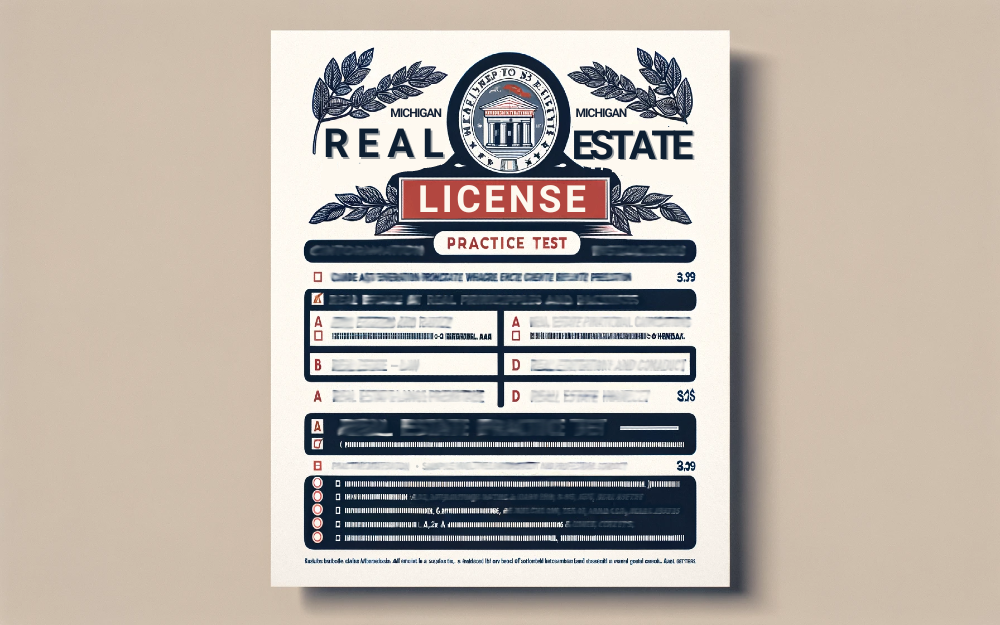
Determine your answer, then click the arrow to see the correct response.
The Term "Littoral Rights" Refers To:
A) Rights of property owners along a river
B) Rights of property owners along an ocean or lake
C) Rights to extract minerals from the property
D) Rights to use airspace above the property
Correct Answer: B) Rights of property owners along an ocean or lake
Explanation: Littoral rights pertain to property owners whose land borders an ocean, sea, or lake.
Which of the Following Best Describes "Steering"?
A) Persuading owners to sell by suggesting the neighborhood is changing
B) Refusing to make loans in certain neighborhoods
C) Directing buyers toward or away from certain neighborhoods based on race
D) Charging different prices to buyers based on race
Correct Answer: C) Directing buyers toward or away from certain neighborhoods based on race
Explanation: Steering is an illegal practice of directing prospective buyers to or away from certain areas based on race or ethnicity.
What Is the Primary Difference Between a Mortgage and a Deed of Trust?
A) A mortgage involves three parties, while a deed of trust involves two
B) A mortgage involves two parties, while a deed of trust involves three
C) A mortgage is used for commercial properties, while a deed of trust is used for residential properties
D) There is no difference between the two
Correct Answer: B) A mortgage involves two parties, while a deed of trust involves three
Explanation: A mortgage involves a borrower and a lender, while a deed of trust involves a borrower, a lender, and a trustee.
In a Real Estate Transaction, a "Contingency" Is:
A) A condition that must be met for the contract to be binding
B) A legal defect in the title
C) A secondary offer on the property
D) A required disclosure by the seller
Correct Answer: A) A condition that must be met for the contract to be binding
Explanation: A contingency is a condition in a contract that must be met for the contract to be enforceable.
A Buyer in Michigan Hires a Home Inspector Who Finds Significant Issues With the Property. What Can the Buyer Do Next?
A) Proceed with the purchase regardless of the issues
B) Negotiate repairs or a price reduction with the seller
C) Cancel the contract if it contains an inspection contingency
D) B and C
Correct Answer: D) B and C
Explanation: The buyer can negotiate repairs or a price reduction, or cancel the contract if it contains an inspection contingency.
Which Type of Deed Provides the Least Protection to the Buyer?
A) Quitclaim deed
B) Bargain and sale deed
C) Special warranty deed
D) General warranty deed
Correct Answer: A) Quitclaim deed
Explanation: A quitclaim deed provides the least protection as it conveys only the grantor’s interest, if any, without warranties.
How Often Must a Real Estate Salesperson in Michigan Renew Their License?
A) Annually
B) Every two years
C) Every three years
D) Every five years
Correct Answer: C) Every three years
Explanation: Michigan real estate salespersons must renew their licenses every three years.
In Michigan, a Real Estate Licensee Must Disclose Any Known Material Facts About a Property:
A) Only if asked by the buyer
B) Before showing the property
C) At the time of signing the purchase agreement
D) At any time during the transaction
Correct Answer: D) At any time during the transaction
Explanation: Licensees must disclose known material facts at any time during the transaction process.
A Buyer in Michigan Signs a Purchase Agreement That Includes an Appraisal Contingency. The Appraisal Comes in Lower Than the Purchase Price. What Options Does the Buyer Have?
A) The buyer must proceed with the purchase at the agreed price
B) The buyer can terminate the contract and recover the earnest money
C) The buyer can renegotiate the purchase price with the seller
D) Both B and C
Correct Answer: D) Both B and C
Explanation: The buyer can either terminate the contract and recover the earnest money or renegotiate the purchase price with the seller.
A Buyer's Agent in Michigan Presents an Offer That Is Accepted by the Seller. The Buyer Later Finds Out They Were Pre-Approved for a Lower Loan Amount Than Needed. What Should the Agent Do?
A) Inform the seller immediately
B) Help the buyer find additional financing
C) Advise the buyer to terminate the contract if they cannot secure financing
D) Both B and C
Correct Answer: D) Both B and C
Explanation: The agent should help the buyer find additional financing or advise them to terminate the contract if financing cannot be secured.
